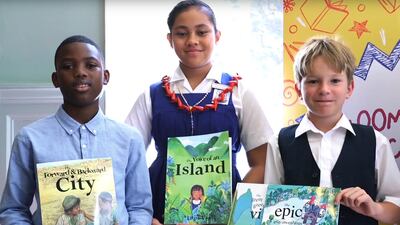What does the future look like in the eyes of a nine-year-old? Maybe if we could tap into a child's sense of wonder, we could rehabilitate our own. And if we imagine a better world, maybe we could help lay its foundations.
This is, in part, what the writing initiative, Voices of Future Generations, held under the patronage of the Unesco, aims to accomplish. The global competition, which has been running since 2014, was developed to give children a platform to voice their hopes and aspirations for a sustainable future – all through the written word. Since its launch, the programme has published 12 books featuring children's writing, including an anthology of eight short stories and 11 individual books.
For the first time, the Middle East will be taking part in the competition with a target to support 20 story submissions in both Arabic and English. The Emirates Literature Foundation is the consultant for the initiative in the Gulf, under the patronage of Sheikha Hissa Hamdan bin Rashid Al Maktoum, who is the regional UN Goodwill Ambassador.
The competition is open to all children aged eight to 12. Winners will have the chance to join a global council of prize-winning child authors, and have their work featured online and in inspirational books that will be sent to schools and libraries around the world. Submissions are free of charge and will run from January to April next year.
"The hunt is on for original and imaginative adventure stories that draw attention to children's rights and to sustainability," says Isobel Abulhoul, chief executive and trustee of the Emirates Literature Foundation. "The judges will look for creativity and imagination. Stories showing characters that overcome challenges, as they must in all good adventure tales."
A group of judges in Dubai, which comprises of a team of educators, Abulhoul and Sheikha Hissa, will conduct the initial shortlist of stories. The 20 finalists will then be reviewed by the Voices of Future Generations International Commission and other Goodwill Ambassadors. One story from the Gulf will be published in the book. However, all shortlisted authors will be awarded certificates along with gold, silver and bronze medals.
Abulhoul’s advice to parents and teachers is to encourage children to think about the future they want to see. “They can also look at some of the child’s favourite stories and try to identify what they like about it. Encouraging children to visualise a more sustainable world through their imagination and adventurous spirit is a brilliant starting point.”
Judges will consider a story's theme, character development and plot. The stories, Abulhoul says, should animate a vision for a sustainable future. They should also stimulate positive feelings of hope and possibility for the main protagonist, while the plot should hook the reader with the urge to find out how the challenge is overcome by the end of the story.
“I think it is important for children, their parents and teachers to focus on how to tell a good story. It often starts with an idea, a character, and then a journey through the tale. I would never worry about spelling or punctuation, but on the creative ideas,” Abulhoul says, adding that the most important tip is to write. “The more that a child writes down their ideas, becomes familiar with how to use words to set a scene, the better their written work will become.
“Stories should be written from a child’s point of view or be about an adventure that a child character experiences. They must feature themes around children’s rights and sustainable development. It is key that stories include the writer’s vision for a sustainable future,” Abulhoul adds.
The Emirates Literature Festival will be running workshops for teachers on how to get children involved in the annual competition.
"The workshops for teachers and parents will focus on tips for creative writing overall, as well as the UN Sustainable Development Goals and Children's Rights." The children's workshops, which will be held on Saturdays or as an after-school activity on weekdays, will focus on story-building, inviting children to practice their writing in the lead up to the submission deadline date.
“Children’s workshops work better in smaller groups, so we will host no more than 20 children at a time.”
Stories can be submitted by students, parents and teachers through the Voices of Future Generations Arabia website. More details can be found at www.elfdubai.org/en/vofg



